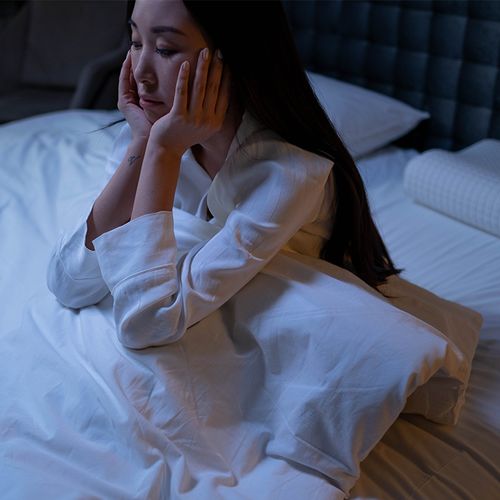Sleepless nights can mean more painful days, according to the latest research done at Johns Hopkins University.
A new study finds that when people have sleep disturbances-insomnia, frequent awakenings from crying babies, or other interruptions to sound shut-eye-their pain threshold quickly decreases.
Explanation: So-called "fragmented sleep profiles" alter body systems that regulate and control pain, explains researcher Michael T. Smith of Johns Hopkins University.
The Study
Smith tracked 32 healthy women whose sleep patterns were studied for seven nights. For the first two nights, the women slept undisturbed for eight hours. For the next few nights, the women were then assigned to one of three groups: a control group that continued to sleep undisturbed; a forced awakening (FA) group awakened once an hour (eight times) through the night; and a restricted sleep opportunity (RSO) group subjected to partial sleep deprivation by delaying their bedtime.
On the sixth night, the women in both the FA and RSO groups underwent 36 hours of total sleep deprivation, followed by an 11-hour recovery sleep.
Researchers then tested the women's pain thresholds and pain inhibition. Those with interrupted (FA) sleep showed an increase in spontaneous pain.
Bottom line: "Our research shows that disrupted sleep, marked by multiple prolonged awakenings, impairs natural pain-control mechanisms that are thought to play a key role in the development, maintenance, and exacerbation of chronic pain," says Smith.
Mental, Physical Torture Inflict Similar Pain
Which causes more pain—mental or physical torture? After weighing the evidence—including interviews with 279 victims of either form of torture-British researchers conclude that it is too close to call: The resulting degree of mental distress and trauma is about the same from either form of torture.
Previously, some experts believed that physical torture was more devastating.
"Sham executions, witnessing the torture of close ones, threats of rape, fondling of genitals and isolation were associated with at least as much if not more distress than some of the physical torture stressors in terms of associated distress," note researchers from the University of London.
The team concludes that aggressive interrogation methods or detention involving deprivation of basic needs, being kept in uncomfortable conditions, hooding, isolation, forced nudity, forced stress positions, threats, humiliating treatment and other psychological abuse inflict as much mental harm as physical torture.
Meditation Lowers Brain's Pain Response Up to 50%
To boost your pain tolerance, say "ommm." Practicing transcendental meditation (TM) 1 may reduce the brain's reaction to physical anguish.
So say scientists at the University of California, Irvine after using brain scans to monitor pain responses in those practicing this meditation program, which previous research suggests may improve high blood pressure and help ease other ailments.
"Prior research indicates that transcendental meditation creates a more balanced outlook on life and greater equanimity in reacting to stress," says meditation researcher David Orme-Johnson, who headed the NIH-funded study. This study suggests that this is not just an attitudinal change, but a fundamental change in how the brain functions.
The Study
First, his team used neuroimaging to study the brain's pain reaction centers in 12 healthy people who have been practicing TM for 30 years. They were compared with 12 others who never practiced TM, which involves meditating twice a day, for about 20 minutes each time, with the use of a "mantra" word.
When exposed to the same pain, these long-time meditators had a 40% to 50% lower response to pain than 12 others who did not practice the program.
The kicker: After those non-meditators had learned and practiced TM for five months, their brains were retested...and their pain response had also decreased by up to 50%.
